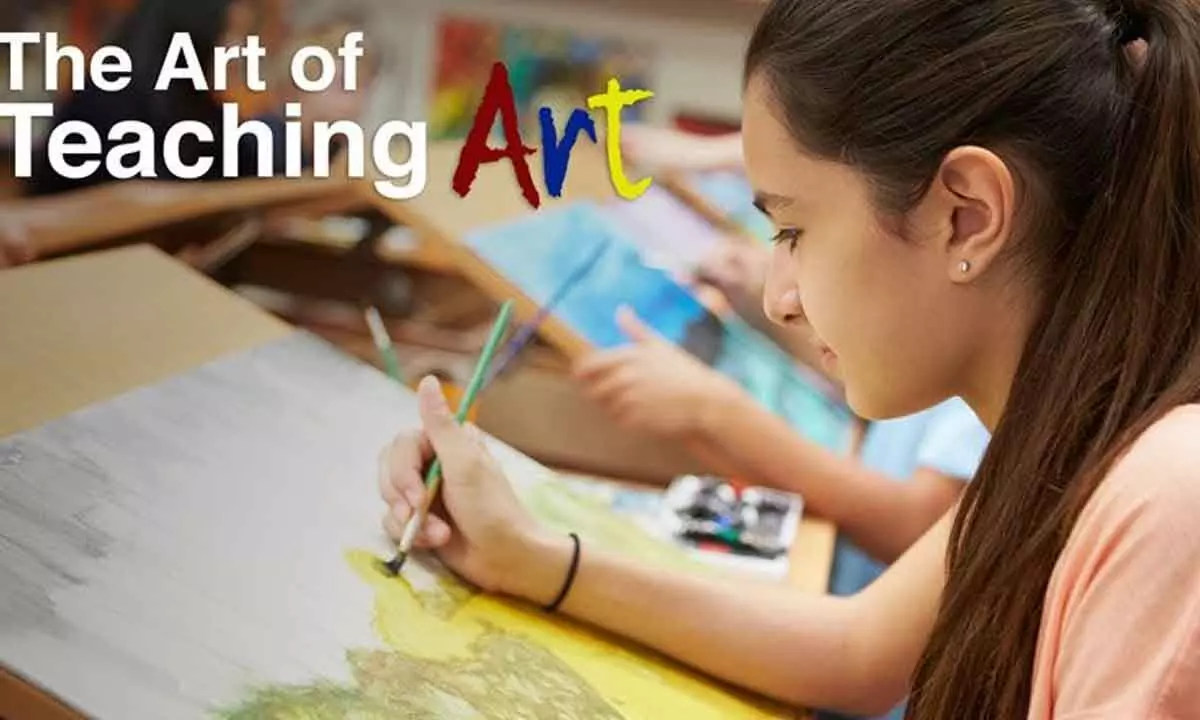Live
- HCLTech partners AWS to accelerate GenAI adoption
- Edited & fake videos on social media: Congress delegation meets Delhi Police Commissioner
- Poonch terror attack: Security forces release sketches of two terrorists
- Constituency Watch: For BJP it’s fight for consolidation while Congress sees an opportunity to regain past glory in Nandurbar
- Congress, BRS, AIMIM following Muslim League agenda: J P Nadda
- PeopleStrong, Google Cloud join hands to transform employee experience with AI
- Siguler Guff invest Rs 240 crore in Hyderabad-based microfinance lender Spandana Sphoorty
- 'BJP CM will take oath in Odisha on June 10', roars PM Modi at Berhampur rally
- Five-year-old boy found dead after being swept away in Texas floodwaters
- Akhilesh appoints Shyam Lal Pal as new state president of SP
Just In
Fostering creativity and expression: Understanding the significance of arts education


In an increasingly complex and interconnected world, arts education is a guiding light of knowledge. It nurtures critical thinking, creativity, and self-expression, empowering individuals to shape their destinies and influence global trajectories. Schools are paving the way for a vibrant and limitless future where the arts wield transformative power
Amidst the relentless pursuit of academic achievement, the significance of arts education frequently fades into the background. Yet, what often eludes many is the understanding that creativity is more than just a conduit for artistic expression; it stands as the cornerstone of advancement and breakthroughs across all domains. Arts education surpasses the conventional realms of learning, giving students a blank canvas to visualize their aspirations and mould their dreams.
Through nurturing a climate of ingenuity and originality, educational institutions offer students the essential instruments to flourish in a constantly shifting landscape.
Promoting self-expression and empathy
Students can express themselves genuinely and cultivate empathy towards others by engaging in various artistic forms such as music, dance, and theatre. Individuals learn to articulate their emotions and thoughts effectively through the evocative melodies of a musical composition, the expressive movements of a dance performance, or the thought-provoking narrative of a play.
This fosters deeper connections within their communities and a heightened understanding and appreciation of diverse perspectives and experiences.
Cultivating creativity and resourcefulness
Arts education provides an enriching environment for cultivating creativity and fostering innovation. Schools inspire imagination by prompting students to delve into various mediums and viewpoints, nurturing a climate of experimentation and inventiveness.
Through activities like painting, sculpting, or engaging in improvisational theatre, students develop the ability to think beyond conventional boundaries, tackle problems creatively, and confront obstacles with resourcefulness.
Encouraging interdisciplinary learning
Arts education embraces interdisciplinary learning, transcending boundaries to provide students with multidisciplinary exploration and collaboration opportunities.
By integrating art with science, technology, engineering, and mathematics (STEM) disciplines, schools foster a holistic approach to learning that encourages creativity, innovation, and interdisciplinary problem-solving.
Boosting cultural awareness
Through exposure to different forms of art and artistic traditions, individuals gain a deeper understanding and appreciation of diverse cultures and perspectives. This cultivates cultural awareness and promotes tolerance and understanding in society.
Enhancing critical thinking and problem-solving skills
Engagement with the arts cultivates critical thinking skills and fosters a capacity for analytical reasoning and reflection. Whether students analyse a piece of artwork, deconstruct a musical composition, or interpret a theatrical performance, they learn to approach problems from multiple perspectives, honing their ability to think critically and creatively.
Raising future leaders and innovators
Arts education is instrumental in nurturing the qualities essential for leadership and innovation, empowering students to become proactive agents of change in their communities and beyond. Schools equip students with the skills and mindset necessary to address complex challenges and shape a more inclusive and sustainable future by harnessing creativity, fostering collaboration, and promoting resilience.
Stimulating personal growth and well-being
Arts education goes beyond academics, promoting personal growth, resilience, and well-being. Individuals develop self-confidence, self-awareness, and emotional resilience through creative expression, contributing to their mental and emotional wellness.
Strengthen collaboration and teamwork
The collaborative nature of the arts encourages teamwork, communication, and cooperation, vital skills for success in today’s interconnected world. Whether students work together on a musical ensemble, choreograph a dance piece, or produce a theatrical production, they learn to collaborate effectively towards a common goal, embracing diversity and celebrating collective achievements.
Conclusion
In an increasingly complex and interconnected world, arts education is a guiding light of knowledge. It nurtures critical thinking, creativity, and self-expression, empowering individuals to shape their destinies and influence global trajectories. Schools are paving the way for a vibrant and limitless future where the arts wield transformative power.
(The author is Principal Modern Public School, Delhi

© 2024 Hyderabad Media House Limited/The Hans India. All rights reserved. Powered by hocalwire.com






